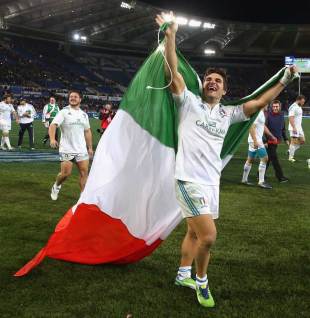|
Italy Comment
Revolution in Rome
Enrico Borra
March 22, 2013

Giovambattista Venditti celebrates Italy's shock win over France in this year's Six Nations
© Getty Images
Enlarge
Italy have finally arrived, and they are here to stay. That's one of the lessons we've learned over the recent, unprecedented and, to be honest, a slightly upsetting Six Nations. While France and Ireland suffered their worst ever finish in the Six Nations, Italy emerged as the most improved team. They secured two wins, which equals their record in 2007, and defeated Ireland in Rome for the first time the Championship. Thanks to the revolution overseen by Frenchman Jacques Brunel since his appointment in November 2011, Italy have transformed their philosophy and reached a new level of competitiveness. Never before have the Italians been able to show their rivals such willingness, belief and personality. Since joining the championship, Sergio Parisse and his colleagues have been labelled as a strong scrummaging team with a very abrasive defensive-oriented game. But over the past two months they have surprised everybody with a more offensive and open style of play. This change in the Azzurri's mentality can be seen in the numbers recently released by the Six Nations organisers. These figures sum up the fast and radical turnaround brought by Brunel in less than fifteen months in charge. On the back of the Championship's strongest lineout (90% success on their throw and more than two steals per game) and a solid 91% in scrum success, Italy enjoyed more possession than ever before - a Six Nations leading average of 19.09 minutes per game*. They ran the ball like no other side with more than 122 carries per game, which led to an incredible 420 metres gained on average per game. In comparison Wales carried 114.2 times a game and made 316.4 metres, while Scotland carried just 67.4 times and England gained just 369.4 metres.
Italy also made more passes and offloads (yes, you have read that right) than their rivals - although they did top the charts in turnovers with more than 15 per game. These are astonishing numbers for a team like Italy, who usually only top the 'tackles made' category. The problem now is how to convert the amount of possession and territory into points. They were in fact one of the worst teams in terms of points scored per game (15 compared to Ireland's 14.4) - a galaxy away from the 24 points averaged by the triumphant Wales. Having the ball in hands more than ever meant they lost concentration in defence at times (though less so in the red zone where they weathered a few crucial moments) and the 89% of tackle success (lowest with England and Scotland) is a warning. The most astonishing stat is the number of penalties conceded. With almost 20 minutes of possession per game, Italy were the second highest penalised team with 13.2 penalties on average (second only to Scotland with 14.8). They also collected almost a yellow card per game (second worst after Ireland). The main issue for Italy remains consistency. They failed to back up the impressive opening day win over France with a weak performance against Scotland just a week later at Murrayfield - and then came their lowest point of the Championship against Wales in Rome. A lot, although not everything, depended on the fly-halves. Both were less than inspired against Scotland and Wales and it is a recurring problem. But Luciano Orquera, 31, has adapted to Brunel's rugby philosophy better than most. His decent percentage from the tee has helped the Italians capitalise on the great work done by Alessandro Zanni, one of the best blindisde flankers around, and Parisse. One thing is for sure: when Orquera, Luke McLean and Andrea Masi started to win tactical kicking battles, Italy threatened their opponents like never before. The other grey area is the scrum. Even with a 91% efficiency Italy showed some unexpected problems against Scotland, Wales and England. They clearly need to bring in fresh blood behind props Martin Castrogiovanni and retired hero Andrea Lo Cicero. Alberto De Marchi, 26, Lorenzo Cittadini and Michele Rizzo, both 31, look ready to fill the gap but the search must start for a new generation of front-row players if Italy are to maintain their tradition strength in the setpiece. So for the first time, an Italy Six Nations campaign will be remembered for their running rugby and desire to keep the ball alive, rather than simply for their commitment and impressive work rate. In conclusion, they fight, they battle, and now they play rugby. *Average time in possession per game in 2013 Six Nations: England 16:45 , France 18:01, Ireland 16:21, Italy 19:09, Scotland 12:59, Wales 18:02 © ESPN Sports Media Ltd.
| |||||||||||||||
Live Sports
Communication error please reload the page.
-
Football
-
Cricket
-
Rugby
-
- Days
- Hrs
- Mins
- Secs
F1 - Abu Dhabi GP
Abu Dhabi Grand Prix December 11-131. Max Verstappen ()
2. Valtteri Bottas (Mercedes)
3. Lewis Hamilton (Mercedes)
4. Alexander Albon ()
5. Lando Norris ()
6. Carlos Sainz Jr ()
-
ESPNOtherLive >>
Snooker - China Open
Tennis - Miami Open

